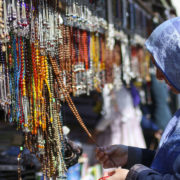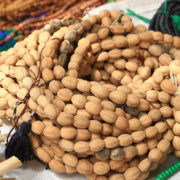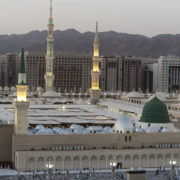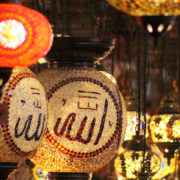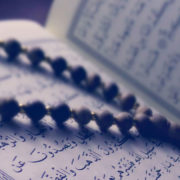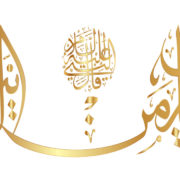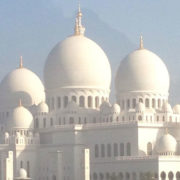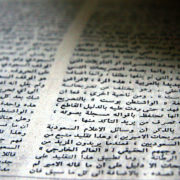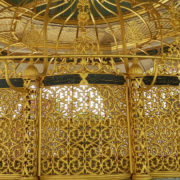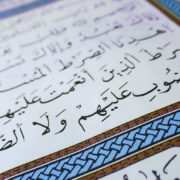منازل الآخرة – الطريق الى الخلود
STAGES OR STAGES OF THE HEREAFTER
THE PATH TO ETERNITY
By
Yasin T. al-Jibouri
6) STAGE SIX OF THE LIFE HEREAFTER
The Barzakh
البرزخ
Is The Barzakh similar to the Purgatory? It is one of the terrifying stages or stages through which the vast majority of people will pass. Exceptions are two kinds: People with whom the Almighty is very pleased, and these go straight to Paradise, and people with whom He is very displeased, and these go straight to hell. Neither group will go through whatever goes on in the grave as indicated above. The barzakh is mentioned in the Holy Qur’an in places such as this:
وَمِن وَرَائِهِم بَرْزَخٌ إِلَى يَوْمِ يُبْعَثُونَ
“(There) is a barrier before them till the Day they are raised up (from their graves for judgment)” (Qur’an, 23:100). This barrier separates this short temporal life as we know it from the other everlasting one awaiting us, but it is also one of its stages or stages, a station, if you will. On p. 71, Vol. 1 of Safeenat al-Bihar we are told that Imam as-Sadiq (as) pointed out to the barzakh once saying, “By Allah, I fear for you the barzakh.” He was asked, “What is the barzakh?” He said, “It is the grave from the moment of death till the Day of Judgment.”
قال الامام الصادق عليه السلام في حديث:
«ولكني والله اتخوف عليكم من البرزخ. قيل له: وما البرزخ ؟ قال: القبر منذ حين موته الى يوم القيامة.
It has been cited from ar-Rawandi’s book Lubb al-Lubab that those in the graves go to call upon their families, offspring and relatives and tearfully plead to them saying: “O our children!! O our families! O our relatives! Have mercy on us and bestow upon us of the good things with you and the good deeds, and do remember us, may Allah have mercy on you. We have sat in narrow prisons, bearing many worries and concerns; so, do not be too miser to pray for us and to pay alms on our behalf before your fate becomes similar to ours, perhaps Allah will have mercy on us all. Alas! We used to be like you, enjoying blessings, but we did not spend in the way of Allah, so our wealth turned into a calamity on our heads while others benefited from it; so, listen to us and do not forget to do us a favor with a dirham or a loaf of bread or whatever you wish, for you shall join us; you shall weep and your tears will not do you any good, just as we do although we find doing so to be futile. Work hard and seize the opportunity before it is gone and before your condition will be similar to ours.”
ونقل عن لبّ اللباب للقطب الراوندي قال: وفي الخبر كان الموتى يأتون فيقفون ، وينادي كلّ واحد منهم بصوت حزين باكياً:
يا أهلاه ! يا ولداه ! وياقرابتاه ! اعطفوا علينا بشيء يرحمكم الله ، واذكرونا ولا تنسونا بالدعاء وارحموا علينا وعلى غربتنا ، فانّا قد بقينا في سجن ضيق ، وغمّ طويل وشدّة ، فارحمونا ، ولا تبخلوا بالدعاء والصدقة لنا لعل الله يرحمنا قبل أن تكونوا مثلنا. فواحسرتاه قد كنّا قادرين مثل ما أنتم قادرون
فيا عباد الله: اسمعوا كلامنا ولا تنسونا فانّكم ستعلمون غداً فانّ الفضول التي في ايديكم كانت في أيدينا فكنّا لاننفق في طاعة الله ، ومنعنا عن الحقّ ، فصار وبالاً علينا ومنفعةً لغيرنا . اعطفوا علينا بدرهم أو رغيف أو بكسرة.
ثم ينادون ما أسرع ما تبكون على انفسكم ولا ينفعكم كما نحن نبكي ولا ينفعنا فاجتهدوا قبل أن تكونوا مثلنا.
Is the barzakh similar to the purgatory? Catholics believe that the purgatory is a place where the souls of the dead are cleansed before receiving God’s grace, and such cleansing includes atonement through pain. This seems to be close to the Islamic concept because the Almighty punishes many of His servants in the grave in order to affect justice so He may not punish them again in hell. This does not apply to everyone, however, because some sinners are punished in this life, in the grave and in hell as well. This “purging” in which the Catholics believe may be close to the “grave’s constriction” detailed above. It is also stated in some traditions that this constriction, or the torment in the grave, is one of the manifestations of the Almighty Who does not wish to torment His servants twice; so, the grave is the last stage where they have to “pay” for some of their sins. But it is better, of course, to avoid such torment by doing simple things in this life that will spare you having to go through it, in other words, the munjiyat, acts bringing salvation, the easiest of which is recitation of supplications on a regular basis and helping others morally and financially, that is, those who deserve to be helped as explained in the Qur’an and Sunnah. The best way to offer charity, of course, is to give with the right hand what the left does not know, that is, let it be a secret you keep to yourself; do not make a show of it and thus lose its rewards. In the reference Jami` al-Akhbar, we read the following on p. 197:
ذكر صحابي عن الرسول الأعظم (ص) أنه قال:
“إبعثوا بهداياكم إلى موتاكم” فسئل عن هدايا الموتى، فقال: “الصدقه و الدعاء”.
A companion of the Greatest Prophet (P) cited the Prophet (P) as saying, “Send your gifts to your dead.” He was asked about what gifts could be sent to the dead, so he said, “Charity and supplication.” If you read the classic reference written by al-Harrani titled Thawab al-A`mal, you will see how rewards for good deeds multiply by many times, starting from the tenfold promised in the Almighty for a good deed and go up the ladder till they reach an astronomical figure of one hundred thousand times. Who will be rewarded so many times and for what? One who offers charity on behalf of both his deceased parents will receive them. If his parents still living, he will receive in the hereafter ten thousand times as much as he gives away as charity in the life of this world on their behalf. But if you have no money to pay charity, supplications will do. A combination of both is the best, though, if you really want to shun many horrors awaiting us in the hereafter and to live a very happy and blissful life here and hereafter.
و فيه أيضا عن النبي الكريم (ص) أنه قال:
إذا تصدق أحدكم لميت، فإن ملكا يحملها في طبق من نور، تمتد أشعته حتى تبلغ السماوات، فيقف على حافة القبر، وينادي بأعلى صوته:
السلام عليكم يا أهل القبور، هذه هدية أهلكم إليكم! فيتسلمها الميت، و يدخلها قبره، و يتسع بها مضجعه. ….
ثم قال رسول الله (ص):
إعلموا أنه من ترحم على ميت بصدقه، فله أجر عند الله مثل جبل أحد، و هو يوم القيامه تحت ظل عرش الله، إذ لا ظل سواه يومذاك و ينجو بالصدقه الأموات و الأحياء.
In the same reference, that is, Jami` al-Akhbar, we read the following on the same page: “The Revered Prophet (P) has been quoted as saying, ‘If one of you offers charity on behalf of a deceased person, an angel carries it on a platter of noor (celestial light) the rays of which extend and reach the heavens. He stands at the edge of the grave and calls out as loudly as he can, saying: Peace be with you, O people of the graves! This is a gift sent to you by your family! The deceased person receives it and takes it with him inside his grave: It expands his resting place…” Then the Messenger of Allah (P) added saying, “Be informed that when someone seeks mercy for a deceased person through offering charity on his behalf, he will get rewards as large as the Uhud Mountain, and he will be on the Judgment Day under the shade of Allah’s `Arsh when, on that Day, there will be no shade other than it, and charity will be the salvation of the dead and of the living.” Here we must point out that many writers write about the thirst and hunger of the Judgment Day but do not say much about the darkness which will engulf the bad ones. There are many references to the noor, celestial light, that will shine through and for the good ones on that Day, whereas the bad ones will be terrified because they will have no noor that will enable them to see what is around them, and they will most likely suffer from the stench of the pus coming out of the bodies of many in their company whose bodies will be smitten by the angels of torture. Contrary to their condition is enjoyed by those whom the Almighty will bless on that Day: These will have noor, shade on their heads rather than heat and be brought drinks and fruits from Paradise as they watch others being tried, that is, court marshaled! On p. 59, Vol. 74 and on pp. 573-4 of Zad al-Ma`ad, we read the following statement by Imam as-Sadiq (as):
قال الامام الصادق (ع) يرد الصوم والصلاة والصدقة والحج والأدعية والخيرات على الميت في قبره، و يكتب ثواب جميع الأعمال للميت و لفاعل الخير معا
“Fast, prayers, charity, pilgrimage, supplications and good deeds reach the deceased person inside his grave, and the rewards of all deeds done on behalf of the deceased person will be recorded as they are for the doer of these deeds.”
With best regards of Yasin T. al-Jibouri. I invite you to visit my Scribd Web Page by clicking on this link: http://www.scribd.com/yasinaljibouri to review 41 of my books and articles. Publish, reprint, quote or just enjoy them! I also invite you to visit my Amazon web page to see a list of some of the books which I have written, edited or translated; the link is:
http://www.amazon.com/s/ref=nb_sb_noss?url=search-alias%3Daps&field-keywords=yasin+t.+al-jibouri&x=0&y=0

